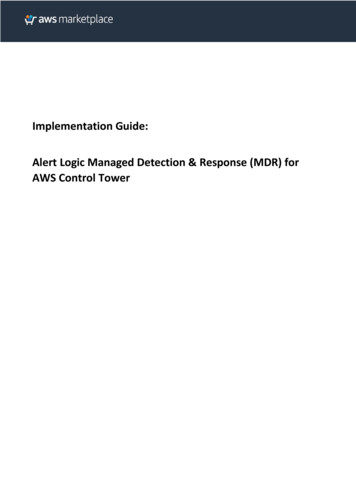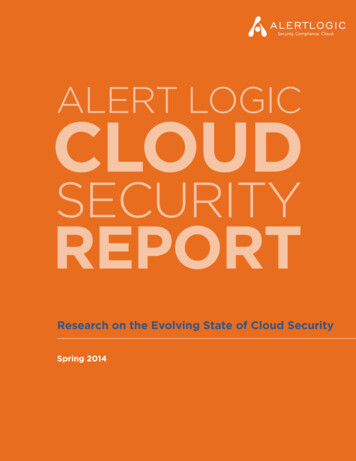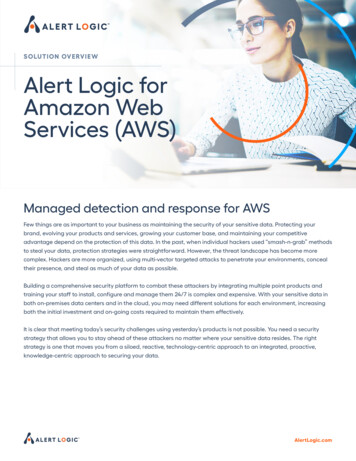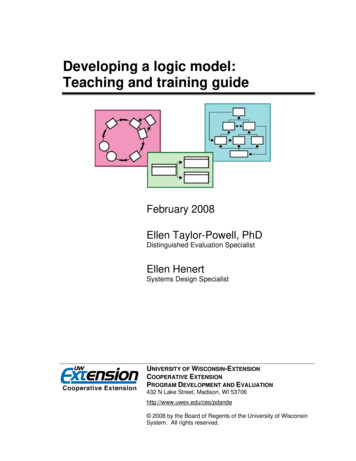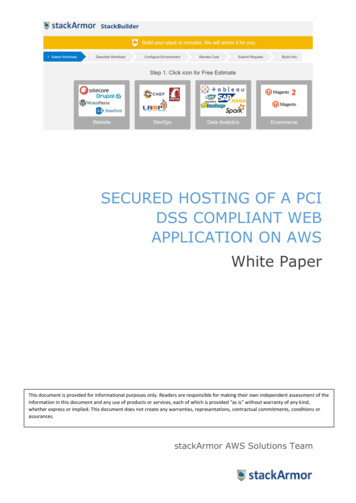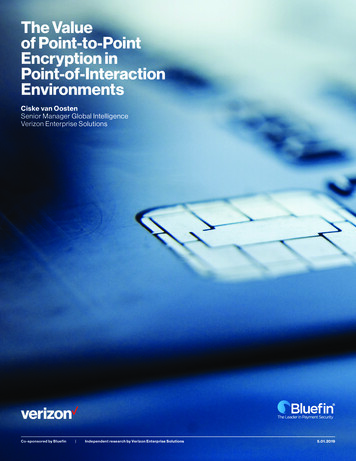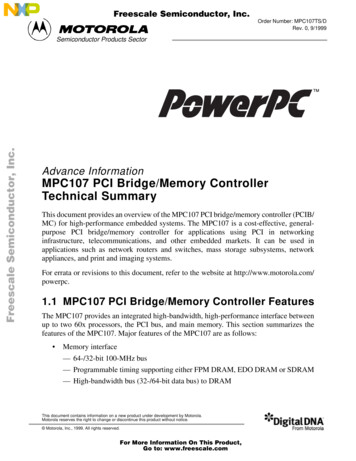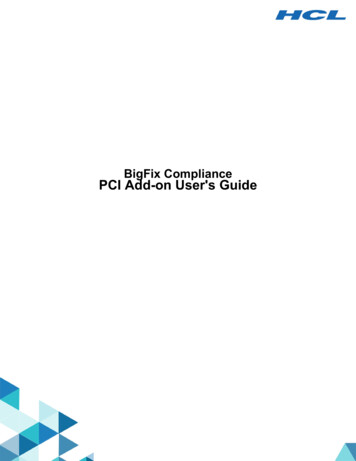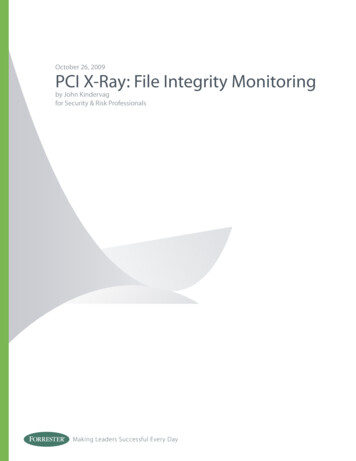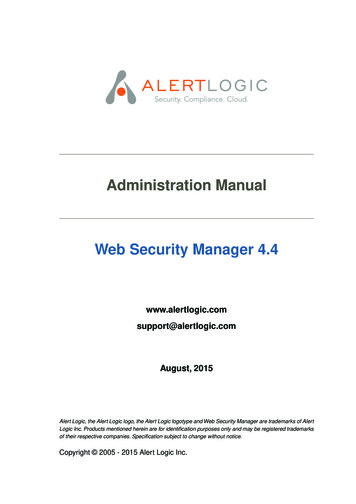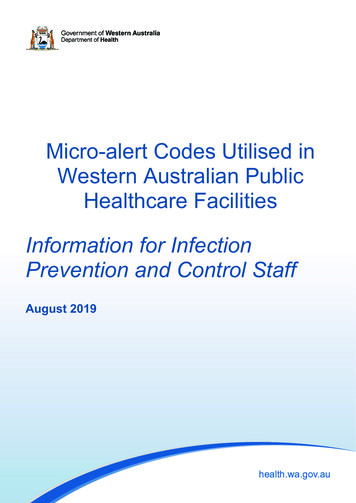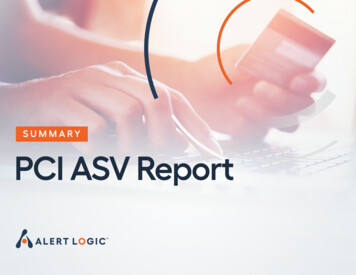
Transcription
Alert Logic is a PCI Security Standards Council Approved Scanning Vendor (ASV) and maintainsstrict compliance with internal and external regulatory requirements for our IT operations andservices, including: PCI DSS 3.2 Level 2 Audit, AICPA SOC 1 & 2 Audit, ISO 27001-2013, andISO/IEC 27701:2019 certification for UK Operations.
PCI ASV Scan Report Attestation of Scan ComplianceA.2 Approved Scanning Vendor InformationA.1 Scan Customer InformationCompany:Company:Albert SystemsContact:John DoeTitle:Telephone:(555) 555-5555E-mail:john.doe@albertsystems.comAlert Logic, Inc. (4222-01-11)Contact:Robert LaBlahTitle:Team Lead, Compliance SpecialistsTelephone:(713) 351-1776E-mail:support@alertlogic.comBusiness Address:1776 Yorktown - 7th FloorCity:State / Province:City:HoustonState / gic.comBusiness Address:A.3 Scan StatusDate scan completed:October 1, 2017 11:35amScan expiration date (90 days from date scan completed):January 1, 2018Compliance Status:FailScan report type:[*] Full scan[ ] Partial scan or rescanNumber of unique components* scanned:1Number of identified failing vulnerabilities:4Number of components found by ASV but not scannedbecause scan customer confirmed components were out of scope:0* A component includes any host, virtual host, IP address, domain, FQDN or unique vector into a system or cardholder data environment.A.4 Scan Customer AttestationAlbert Systems attests on October 1, 2017 11:35am that this scan (either by itself or combined with multiple, partial, or failed scans/rescans, as indicated in the above Section A.3, "Scan Status") includes all components which should be inscope for PCI DSS, any component considered out of scope for this scan is properly segmented from my cardholder data environment, and any evidence submitted to the ASV to resolve scan exceptions-including compensating controls ifapplicableâ ”is accurate and complete. Albert Systems also acknowledges 1) accurate and complete scoping of this external scan is my responsibility, and 2) this scan result only indicates whether or not my scanned systems are compliant withthe external vulnerability scan requirement of PCI DSS; this scan result does not represent my overall compliance status with PCI DSS or provide any indication of compliance with other PCI DSS requirements.A.5 ASV AttestationThis scan and report was prepared and conducted by Alert Logic under certificate number 4222-01-11, according to internal processes that meet PCI DSS Requirement 11.2.2 and the ASV Program Guide.Alert Logic attests that the PCI DSS scan process was followed, including a manual or automated Quality Assurance process with customer boarding and scoping practices, review of results for anomalies, and review and correction of 1)disputed or incomplete results, 2) false positives, 3) compensating controls (if applicable), and 4) active scan interference. This report and any exceptions were reviewed by Robert LaBlah.
Alert Logic is a PCI Security Standards Council Approved Scanning Vendor (ASV) and maintainsstrict compliance with internal and external regulatory requirements for our IT operations andservices, including: PCI DSS 3.2 Level 2 Audit, AICPA SOC 1 & 2 Audit, ISO 27001-2013, andISO/IEC 27701:2019 certification for UK Operations.
PCI ASV Scan Report Attestation of Scan ComplianceA.2 Approved Scanning Vendor InformationA.1 Scan Customer InformationCompany:Albert SystemsContact:John DoeTitle:Telephone:(555) 555-5555E-mail:john.doe@albertsystems.comBusiness Address:Company:Alert Logic, Inc. (4222-01-11)Contact:Robert LaBlahTitle:Team Lead, Compliance SpecialistsTelephone:(877) 960-3383E-mail:support@alertlogic.comBusiness Address:1776 Yorktown - 7th FloorCity:State / Province:City:HoustonState / gic.comA.3 Scan StatusDate scan completed:October 1, 2017 11:35amScan expiration date (90 days from date scan completed):January 1, 2018Compliance Status:FailScan report type:[*] Full scan[ ] Partial scan or rescanNumber of unique components* scanned:1Number of identified failing vulnerabilities:4Number of components found by ASV but not scannedbecause scan customer confirmed components were out of scope:0* A component includes any host, virtual host, IP address, domain, FQDN or unique vector into a system or cardholder data environment.A.4 Scan Customer AttestationAlbert Systems attests on Octobery 1, 2017 11:35am that this scan (either by itself or combined with multiple, partial, or failed scans/rescans, as indicated in the above Section A.3, "Scan Status") includes all components which should be inscope for PCI DSS, any component considered out of scope for this scan is properly segmented from my cardholder data environment, and any evidence submitted to the ASV to resolve scan exceptions-including compensating controls ifapplicableâ ”is accurate and complete. Albert Systems also acknowledges 1) accurate and complete scoping of this external scan is my responsibility, and 2) this scan result only indicates whether or not my scanned systems are compliant withthe external vulnerability scan requirement of PCI DSS; this scan result does not represent my overall compliance status with PCI DSS or provide any indication of compliance with other PCI DSS requirements.A.5 ASV AttestationThis scan and report was prepared and conducted by Alert Logic under certificate number 4222-01-11, according to internal processes that meet PCI DSS Requirement 11.2.2 and the ASV Program Guide.Alert Logic attests that the PCI DSS scan process was followed, including a manual or automated Quality Assurance process with customer boarding and scoping practices, review of results for anomalies, and review and correction of 1) disputedor incomplete results, 2) false positives, 3) compensating controls (if applicable), and 4) active scan interference. This report and any exceptions were reviewed by Robert LaBlah.
PCI ASV Scan Report Executive SummaryPart 1. Scan InformationScan Customer Company:Albert SystemsASV Company:Alert Logic, Inc. (4222-01-11)Date scan was completed:October 1, 2017 11:35amScan expiration date:January 1, 2018Part 1.a Submitted Scan Scope178.62.7.32Part 2. Component Compliance SummaryComponents (IP Address,domain, etc.):Fail178.62.7.32Part 3a. Vulnerabilities Noted for each Component178.62.7.32ComponentVulnerabilities Noted per .62.7.32Port: 80/tcpClickjacking - X-Frame-Options Header missingMedium6.8Fail178.62.7.32Port: 80/tcpAutocomplete Password in BrowserMedium6.2Fail178.62.7.32Port: 22/tcpCVE-2016-0778 - OpenSSH - Buffer Overflow IssueMedium4.6Fail178.62.7.32Port: 22/tcpCVE-2016-0777 - OpenSSH - Information Disclosure IssueMedium4.0Fail178.62.7.32Port: 443/tcpWeb Service is RunningLow2.1Pass178.62.7.32Port: 80/tcpWeb Service is RunningLow2.1Pass178.62.7.32TCP TimestampLow0.0PassExceptions, False Positives, or Compensating Controls(Noted by the ASV for this vulnerability)No NIST CVSS base score is available; exposure rated by vendor (fail)No NIST CVSS base score is available; exposure rated by vendor (fail)No NIST CVSS base score is available; exposure rated by vendor (pass)No NIST CVSS base score is available; exposure rated by vendor (pass)Informational only.Consolidated Solution/Correction Plan for above Component:Reconfigure Service to be More SecureUpgrade OpenBSD OpenSSH to version 7.2.0Disable or Uninstall Unused SoftwarePart 3b. Special notes by ComponentComponent Special NoteItem Noted178.62.7.32Remote Access - ssh Port:22Due to increased risk to the cardholder data environment when remote accesssoftware is present, .Part 3c. Special notes - Full textScan customer's description of action taken and declaration that software is either implementedsecurely or removed
NoteRemote Access - ssh - Port:22Due to increased risk to the cardholder data environment when remote access software is present, please 1) justify the business need for this software to the ASV and 2) confirm it is either implemented securely per Appendix C or disabled/removed. Please consult your ASV if you have questions about this Special Note.Part 4a. Scan Scope Submitted by Scan Customer for DiscoveryIP Addresses/ranges/subnets, domains, URLs, etc.178.62.7.32Part 4b. Scan Customer Designated "In-Scope" Components (Scanned)IP Addresses/ranges/subnets, domains, URLs, etc.178.62.7.32Part 4c. Scan Customer Designated "Out-of-Scope" Components (Not Scanned)IP Addresses/ranges/subnets, domains, URLs, etc.
Alert Logic is a PCI Security Standards Council Approved Scanning Vendor (ASV) and maintainsstrict compliance with internal and external regulatory requirements for our IT operations andservices, including: PCI DSS 3.2 Level 2 Audit, AICPA SOC 1 & 2 Audit, ISO 27001-2013, andISO/IEC 27701:2019 certification for UK Operations.
PCI ASV Scan Report Attestation of Scan ComplianceA.2 Approved Scanning Vendor InformationA.1 Scan Customer InformationCompany:Albert SystemsContact:John DoeTitle:Telephone:(555) 555-5555E-mail:john.doe@albertsystems.comBusiness Address:Company:Alert Logic, Inc. (4222-01-11)Contact:Robert LaBlahTitle:Team Lead, Compliance SpecialistsTelephone:(713) 351-1776E-mail:support@alertlogic.comBusiness Address:1776 Yorktown - 7th FloorCity:State / Province:City:HoustonState / gic.comA.3 Scan StatusDate scan completed:October 1, 2017 11:35amScan expiration date (90 days from date scan completed):January 1, 2018Compliance Status:FailScan report type:[*] Full scan[ ] Partial scan or rescanNumber of unique components* scanned:1Number of identified failing vulnerabilities:4Number of components found by ASV but not scannedbecause scan customer confirmed components were out of scope:0* A component includes any host, virtual host, IP address, domain, FQDN or unique vector into a system or cardholder data environment.A.4 Scan Customer AttestationAlbert Customer attests on Oct 1, 2017 11:35am that this scan (either by itself or combined with multiple, partial, or failed scans/rescans, as indicated in the above Section A.3, "Scan Status") includes all components which should be in scopefor PCI DSS, any component considered out of scope for this scan is properly segmented from my cardholder data environment, and any evidence submitted to the ASV to resolve scan exceptions-including compensating controls ifapplicableâ ”is accurate and complete. Albert Systems also acknowledges 1) accurate and complete scoping of this external scan is my responsibility, and 2) this scan result only indicates whether or not my scanned systems are compliant withthe external vulnerability scan requirement of PCI DSS; this scan result does not represent my overall compliance status with PCI DSS or provide any indication of compliance with other PCI DSS requirements.A.5 ASV AttestationThis scan and report was prepared and conducted by Alert Logic under certificate number 4222-01-11, according to internal processes that meet PCI DSS Requirement 11.2.2 and the ASV Program Guide.Alert Logic attests that the PCI DSS scan process was followed, including a manual or automated Quality Assurance process with customer boarding and scoping practices, review of results for anomalies, and review and correction of 1) disputedor incomplete results, 2) false positives, 3) compensating controls (if applicable), and 4) active scan interference. This report and any exceptions were reviewed by Robert LaBlah.
PCI Scan Report Vulnerability DetailsPart 1. Scan InformationScan Customer Company:Albert SystemsASV Company:Alert Logic, Inc. (4222-01-11)Date scan was completed:October 1, 2017 11:35amScan expiration date:March 1, 2018Part 2. Vulnerability DetailsIP: 221.99.1.53No CVE assignedName: TCP TimestampAction: Disable or Uninstall Unused SoftwareHostname:PCI: PassPass/Fail Reason:Informational only.Service: UNKNOWNCVSS: 0.0 - Low - (AV:N/AC:M/Au:N/C:N/I:N/A:N/E:ND/RL:ND/RC:ND)EID: 1080Description: TCP timestamps are meant to protect against sequence numbers that have surpassed their original 32-bit cap and have "wrapped." These timestamps are generated with a seed value and incremented at a regular interval.Evidence: TCP TimestampImpact: If the seed value is known (for example: 0), timestamps can be used to calculate system uptime and boot time. This information can further reveal system information about hardware and software being used, as well as help linkspoofed IP and MAC addresses.Solution: Check with your vendor for the option to disable TCP tp://www.forensicswiki.org/wiki/TCP timestampshttp://www.ietf.org/rfc/rfc1323.txtIP: 221.99.1.53Port: 22/tcpCVE-2016-0778Name: CVE-2016-0778 - OpenSSH - Buffer Overflow IssueAction: Upgrade OpenBSD OpenSSH to version 7.2.0Hostname:PCI: FailPass/Fail Reason:Service: SSHCVSS: 4.6 - Medium - (AV:N/AC:H/Au:S/C:P/I:P/A:P/E:F/RL:OF/RC:C)EID: 87207Description: OpenSSH is an open-source implementation of the SSH protocol. A buffer overflow vulnerability has been discovered in OpenSSH, when certain proxy and forward options are enabled. This vulnerability could allow an attacker tocause denial-of-service conditions.Evidence: SSH-2.0-OpenSSH 6.7p1 Debian-5 deb8u3Impact: This application is prone to this vulnerability because of a boundary condition error, allowing an attacker to cause denial-of-service conditions.Solution: It is recommended that users upgrade to the latest version of OpenSSH. This vulnerability has been fixed in OpenSSH index?page content&id c/kb/docDisplay?docId emr ://web.nvd.nist.gov/view/vuln/detail?vulnId CVE-2016-0778IP: 221.99.1.53Port: 22/tcpCVE-2016-0777Name: CVE-2016-0777 - OpenSSH - Information Disclosure IssueAction: Upgrade OpenBSD OpenSSH to version 7.2.0Hostname:Service: SSHPCI: FailPass/Fail Reason:CVSS: 4.0 - Medium - (AV:N/AC:L/Au:S/C:P/I:N/A:N/E:F/RL:OF/RC:C)EID: 87206Description: OpenSSH is an open-source implementation of the SSH protocol. An information disclosure vulnerability has been discovered in OpenSSH. This vulnerability could allow an attacker to obtain sensitive information from processmemory.Evidence: SSH-2.0-OpenSSH 6.7p1 Debian-5 deb8u3Impact: This application is prone to this vulnerability because of an unknown error, allowing an attacker to obtain sensitive information from process memory.
Part 2. Vulnerability DetailsSolution: It is recommended that users upgrade to the latest version of OpenSSH. This vulnerability has been fixed in OpenSSH 7.1p2.It is recommended that Red Hat users apply the following workaround to fix this vulnerability:In Red Hat Enterprise Linux 7 you can mitigate this issue by setting the following option in the OpenSSH client's configuration file, either global (/etc/ssh/ssh config) or user specific ( /.ssh/config):UseRoaming noThe above directive should be placed in the Host * section of the configuration file to use this setting for all SSH servers the client connects to.You can also set the option via a command line argument when connecting to an SSH server:-o 'UseRoaming ex?page content&id c/kb/docDisplay?docId emr ://web.nvd.nist.gov/view/vuln/detail?vulnId CVE-2016-0777IP: 221.99.1.53Port: 80/tcpNo CVE assignedName: Clickjacking - X-Frame-Options Header missingAction: Reconfigure Service to be More SecureHostname:PCI: FailPass/Fail Reason:No NIST CVSS base score is available; exposure rated by vendor (fail)Service: HTTPCVSS: 6.8 - Medium - (AV:N/AC:M/Au:N/C:P/I:P/A:P/E:H/RL:ND/RC:C)EID: 81912Description: The X-Frame-Options HTTP header field declares a policy, communicated from the server to the client browser, regarding whether the browser may display the transmitted content in frames that are part of other web pages. Aclickjacking vulnerability has been discovered when the X-Frame-Options Header is not set. This vulnerability could allow an attacker to disclose information or redirect users.Evidence: Web Server, No details are available.Impact: Web applications are prone to this vulnerability because of websites allowing framing from other domains, allowing an attacker to disclose information or redirect users.Solution: It is recommended that users send the proper X-Frame-Options HTTP response headers that instruct the browser to not allow framing from other data/definitions/693.htmlIP: 221.99.1.53Port: 80/tcpNo CVE assignedName: Autocomplete Password in BrowserAction: Reconfigure Service to be More SecureHostname:PCI: FailPass/Fail Reason:No NIST CVSS base score is available; exposure rated by vendor (fail)Service: HTTPCVSS: 6.2 - Medium - (AV:L/AC:L/Au:S/C:C/I:C/A:N/E:F/RL:W/RC:C)EID: 25962Description: The HTML application was found to contain a Username and Password box that does not explicitly disable the use of the web browsers password autocomplete function, this is considered unsafe and should be corrected.Evidence: /, Password type input named b font color "dark" pwd /font /b from b unnamed form /b with action b login.php /b has autocomplete enabled.Impact: The password autocomplete should always be disabled, especially in sensitive applications, since an attacker, if able to access the browser cache, could obtain the password in cleartext (public computers are a very notable example ofthis attack).Solution: Check the HTML code of the login page to see whether browser caching of the passwords is disabled. The code for this will usually be along the following lines: INPUT TYPE "password" AUTOCOMPLETE "off" The "remember my password" mechanism can be implemented with one of the following methods:Allowing the "cache password" feature in web browsers. As of 2014 this is the preferred method as all major browsers have disabled the setting of autocomplete "off" by default for password fields.Storing the password in a permanent cookie. The password must be hashed/encrypted and not sent in the sting for Vulnerable Remember Password and Pwd Resethttp://www.owasp.org/index.php/Guide to Authentication#Browser remembers passwordshttps://www.owasp.org/index.php/Testing for Vulnerable Remember Password /docs/Web/Security/Securing your site/Turning off form autocompletionIP: 221.99.1.53Port: 80/tcpNo CVE assignedName: Web Service is RunningAction: Disable or Uninstall Unused SoftwarePCI: Pass
Part 2. Vulnerability DetailsHostname:Pass/Fail Reason:No NIST CVSS base score is available; exposure rated by vendor (pass)Service: HTTPCVSS: 2.1 - Low - (AV:L/AC:L/Au:N/C:P/I:N/A:N/E:ND/RL:ND/RC:ND)EID: 11438Description: A web server is running on this port.Evidence: Port: 80, Microsoft-HTTPAPI/2.0Impact: There are many vulnerabilities that have been found with all versions of web servers.Solution: If the web services on a machine are not essential then they should be removed.References:IP: 221.99.1.53Port: 443/tcpNo CVE assignedName: Web Service is RunningAction: Disable or Uninstall Unused SoftwarePCI: PassHostname:Pass/Fail Reason:No NIST CVSS base score is available; exposure rated by vendor (pass)Service: HTTPCVSS: 2.1 - Low - iption: A web server is running on this port.Evidence: Port: 443, Microsoft-HTTPAPI/2.0Impact: There are many vulnerabilities that have been found with all versions of web servers.Solution: If the web services on a machine are not essential then they should be removed.References:Part 3. Detailed Profile Information221.99.1.53OSLinux Linux 3.XOpen p443tcpEID: 11438
PCI Scan Report Vulnerability Details Part 1. Scan Information Scan Customer Company: Albert Systems ASV Company: Alert Logic, Inc. (4222-01-11) Date scan was completed: October 1, 2017 11:35am Scan expiration date: March 1, 2018 Part 2. Vulnerability Details IP: 221.99.1.53 No CVE assigned Name: TCP Timestamp Action: Disable or Uninstall .
